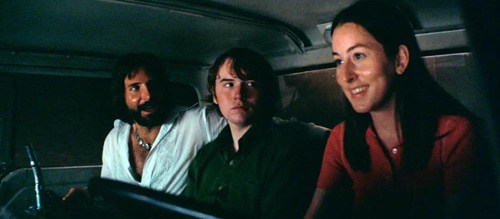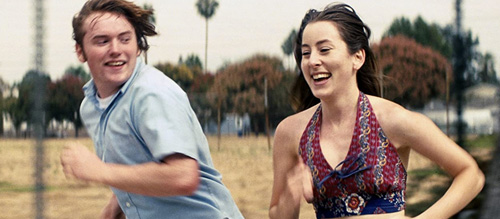Licorice Pizza (2021) Review
Licorice Pizza (2021)
Director: Paul Thomas Anderson
Screenwriter: Paul Thomas Anderson
Starring: Alana Haim, Cooper Hoffman, Bradley Cooper, Sean Penn, Tom Waits, Benny Safdie, Skyler Gisondo, Mary Elizabeth Ellis, John Michael Higgins, Christine Ebersole, Harriet Sansom Harris, Danielle Haim, Este Haim
The latest film from Californian auteur Paul Thomas Anderson – his ninth feature – is a sweet and sunny but by no means schmalzy coming-of-age film set on the periphery of Hollywood in 1973. Calling your film Licorice Pizza might not mean much to international audiences (the title references a record store, fact fans) but it is evocative of childhood for Anderson and sets his stall for perhaps the most personal film of his career so far.
Fifteen year-old entrepreneur Gary Valentine (Cooper Hoffman) falls for his high school photographer Alana Kane (Alana Haim) who makes it clear to him in no uncertain terms that they can be friends but nothing more. Instead, they go into business together to get in on the ground floor of the waterbed and then the pinball machine crazes, just as a fuel shortage and an election campaign hit the San Fernando Valley.
Most aspiring young businessmen still in high school would sell sweets, or cigarettes, or drugs to their classmates, but Gary has far more lofty ambitions, operating his various high-aiming but unsuccessful ventures out of a corner of his mum’s (Mary Elizabeth Ellis) office, usually employing a certain amount of grifting/being economical with the truth to increase his minimal profit margins. Waterbeds are a weird, naff artefact of the 70s and it’s only by hiring a model in a bikini and making use of Alana’s sexy phone voice that they get any business at all before the fuel crisis causes their materials supply chain to dry up.
With the age gap of the central pairing and the somehow-not-icky unrequited romance between a teenage boy and an adult woman, you find yourself thinking of the few other films that managed to strike just the right delicate balance of tone for maximum comic and dramatic effect, like Crazy, Stupid Love.
Incredibly, both Alana Haim and Cooper Hoffman make their film debuts here, and they make it all look so easy. Their weird, warm chemistry and boundless energy keeps Licorice Pizza alive even in some of the film’s less successful stretches, and there’s certainly time enough that this film might have dragged at 133 minutes.
Licorice Pizza feels of a piece tonally with something like George Lucas’ American Graffiti but also Anderson’s own Boogie Nights, only exploring the workings of a very different entertainment industry with much more likeable characters. Like that latter film, this is a tableau of 1970s Los Angeles. It’s a version of reality that references real events and famous people who were around at the time but tweaks them to more snugly fit the story Anderson is trying to tell. The cheeky self-awareness of aspects of the film’s construction is made the most explicit by the fact that the entire Haim family (the band are friends and frequent collaborators with the director) appear as versions of themselves, offering fans of their music both a chance to sit in on their traditional Jewish family dinner and to see Alana telling both of her older sisters to “f*** off”.
This is one of Anderson’s funniest films so far, the best moments making the most of Haim and Hoffman’s natural comic timing. Gary is a former child star and Alana wants to try her hand at acting, so there’s a side-splitting scene where Gary advises Alana to say “yes” to every question his formidable talent agent (Harriet Sansom Harris) asks of her, meaning she ends up claiming to be proficient at horseback riding, archery (separately or at the same time) and speaking Portuguese to maximise her chances of being hired for acting work.
Aside from Gary’s many failed business ventures and Alana’s continuous struggle to find her place in the world, at least until she finds a modicum of purpose volunteering for Benny Safdie’s idealistic mayoral candidate, Anderson’s screenplay is made up of a series of loosely connected vignettes where the central pairing encounter the many eccentrics and troubled souls that inhabit the San Fernando Valley.

In probably the closest thing the film has to a set piece, Gary and Alana have to deliver a waterbed to an emotionally volatile film producer (Bradley Cooper), but when they mess up his house in the process they are forced to attempt an escape in their delivery truck with an empty fuel tank, downhill, and backwards. What Alana can make a heavy goods vehicle do using only her side and rear-view mirrors, and gravity, surely makes her a shoo-in for a future Fast & Furious spinoff.
This has to be up there with the most evocative and moving portrayals of growing into the person you will be for the rest of your life, a huge subject approached largely through visual storytelling, Anderson acting as co-director of photography with Michael Bauman and using 35mm film to evoke the movies of the period. We’re presented with a series of beautiful locked-off shots that illustrate isolation, the characters’ uncertainty over where their lives might lead them next; stand-out visual constructions include Alana standing nervously in a doorway in silhouette against a garish yellow corridor wall, and Alana and Gary filmed from above, lying side by side, intimate but still platonic, suspended by a waterbed lit from below.
It is admittedly less perfect than some of Anderson’s earlier works. Early in the film we meet a sleazy business associate of Gary’s (John Michael Higgins) where a hugely racist but period-appropriate joke at the expense of the Japanese is deployed, and it’s not funny, but Anderson unwisely still decides to recycle it later in the film to leave a bad taste in the mouth all for the sake of an underwhelming punchline. There is also a detour with Sean Penn’s actor character based on William Holden which feels the least essential sub-plot in this story, as good as Penn and a reliably deranged Tom Waits are in it.
Licorice Pizza is big-hearted and soulful, an uplifting coming-of-age quasi-romance that makes for an interesting look at aimless young adulthood. Ease into the film’s unhurried pacing and delightful teenage flights of fancy and you might find yourself compelled to start running, in a tracking shot, towards a brighter future.
21/24


